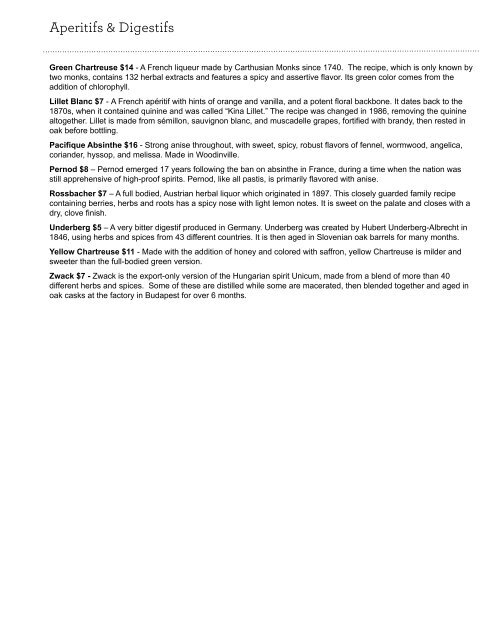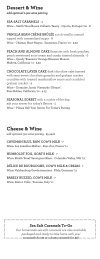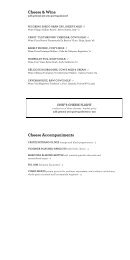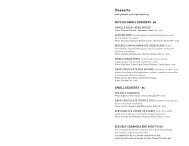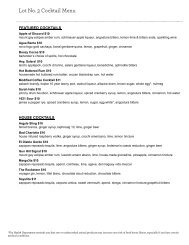Aperitifs & Digestifs Menu - Purple Cafe & Wine Bar
Aperitifs & Digestifs Menu - Purple Cafe & Wine Bar
Aperitifs & Digestifs Menu - Purple Cafe & Wine Bar
Create successful ePaper yourself
Turn your PDF publications into a flip-book with our unique Google optimized e-Paper software.
<strong>Aperitifs</strong> & <strong>Digestifs</strong><br />
Green Chartreuse $14 - A French liqueur made by Carthusian Monks since 1740. The recipe, which is only known by<br />
two monks, contains 132 herbal extracts and features a spicy and assertive flavor. Its green color comes from the<br />
addition of chlorophyll.<br />
Lillet Blanc $7 - A French apéritif with hints of orange and vanilla, and a potent floral backbone. It dates back to the<br />
1870s, when it contained quinine and was called “Kina Lillet.” The recipe was changed in 1986, removing the quinine<br />
altogether. Lillet is made from sémillon, sauvignon blanc, and muscadelle grapes, fortified with brandy, then rested in<br />
oak before bottling.<br />
Pacifique Absinthe $16 - Strong anise throughout, with sweet, spicy, robust flavors of fennel, wormwood, angelica,<br />
coriander, hyssop, and melissa. Made in Woodinville.<br />
Pernod $8 – Pernod emerged 17 years following the ban on absinthe in France, during a time when the nation was<br />
still apprehensive of high-proof spirits. Pernod, like all pastis, is primarily flavored with anise.<br />
Rossbacher $7 – A full bodied, Austrian herbal liquor which originated in 1897. This closely guarded family recipe<br />
containing berries, herbs and roots has a spicy nose with light lemon notes. It is sweet on the palate and closes with a<br />
dry, clove finish.<br />
Underberg $5 – A very bitter digestif produced in Germany. Underberg was created by Hubert Underberg-Albrecht in<br />
1846, using herbs and spices from 43 different countries. It is then aged in Slovenian oak barrels for many months.<br />
Yellow Chartreuse $11 - Made with the addition of honey and colored with saffron, yellow Chartreuse is milder and<br />
sweeter than the full-bodied green version.<br />
Zwack $7 - Zwack is the export-only version of the Hungarian spirit Unicum, made from a blend of more than 40<br />
different herbs and spices. Some of these are distilled while some are macerated, then blended together and aged in<br />
oak casks at the factory in Budapest for over 6 months.<br />
!<br />
!
<strong>Aperitifs</strong> & <strong>Digestifs</strong><br />
Amaro Luxardo Abano $7 - Founded in 1821, Luxardo has grown into one of Italy's foremost distillers of fine spirits.<br />
Amaro Abano is light-bodied with infusions of cardamom, cinnamon, bitter orange peels, and cinchona. It finishes with<br />
striking black pepper.<br />
Amaro Rammazotti $7 - Created in 1815 by Ausano Ramazzotti and produced in Milan. With notes of orange peel,<br />
cardamom, myrrh, galangal, ginger and cinnamon, Rammazotti seamlessly balances bitterness and sweetness.<br />
Aperol $7 – Light in texture, but with a complex, rich taste of orange peel, bitter and sweet herbs, and citrus fruits. The<br />
original recipe has remained unchanged since its creation in 1919.<br />
Averna $8 - Named after its inventor, Salvatore Averna, who developed the recipe in 1868. Herbs, roots, and citrus<br />
rinds are macerated in spirits before caramel is added. Averna is sweet and full-bodied, and has a gently herbal<br />
bitterness.<br />
Bonal Gentiane-Quina $7 - Known as "ouvre l'appétit" – the key to the appetite – it is made with an infusion of<br />
gentian, cinchona, and herbs of the Grand Chartreuse mountains in a mistelle [fortified wine] base.<br />
Byrrh $7 - A wine-based apéritif flavored with quinine. The grapes – mainly Carignan and Grenache from Roussillon –<br />
are transformed into mistelle which is blended with dry red Roussillon wines.<br />
Campari $9 - An Italian apéritif made according to a secret recipe originally developed in 1860 by Gaspare Campari in<br />
Milan. Campari is prominently flavored with assertive, bitter orange peel, and finished with aromatic herbs.<br />
Cocchi Americano $7 - An apéritif wine made from moscato d’asti grapes, with a recipe that includes gentian root,<br />
cinchona bark, orange peel, and various herbs. Noted for its resemblance to Kina Lillet, the original formula of Lillet<br />
Blanc.<br />
Cocchi <strong>Bar</strong>olo Chinato $16 - Famous in Piemonte, <strong>Bar</strong>olo Chinato is D.O.C.G. <strong>Bar</strong>olo wine infused with quinine bark,<br />
rhubarb, ginger, cardamom, and a variety of other aromatic spices.<br />
Cocchi Vermouth di Torino $6 – Made according to the regulations of one of only two protected geographical<br />
indications of origin for vermouth, Cocchi Vermouth di Torino stands apart. The flavor profile is rich and vibrant, with<br />
cocoa, citrus, rhubarb, and a balanced bitter undertone.<br />
Dolin Vermouth $4 - Made to the same set of recipes since 1821, Dolin earned Chambéry, France's only Appellation<br />
d’Origine for Vermouth in 1932. Long the benchmark for fine French Vermouth, it is made from fine wines of the region<br />
and botanicals found in the Alpine meadows above Chambéry. Sweet or Dry.<br />
Fernet Branca $8 - Created in 1845, Fernet Branca is an extremely bitter, aromatic spirit made from over 40 herbs<br />
and spices, including myrrh, rhubarb, chamomile, cardamom, and saffron, with a base of grape spirits. It is aged for<br />
twelve months in oak barrels.


